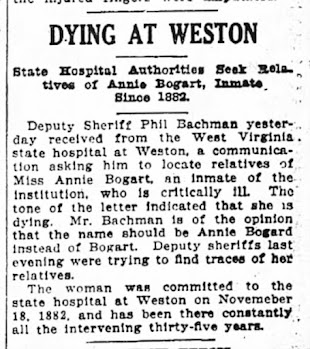 |
| Ladies' Ward at Weston State Hospital |
The Trans-Allegheny Lunatic Asylum, formerly known as Weston State Hospital, is one of West Virginia's most haunted locations. Each year, hundreds of people ascend upon the massive stone Kirkbride building in hopes of experiencing one of the many ghosts believed to still walk the hospital halls. Every once in awhile, I like to bring in a human element by spotlighting the story of an actual patient committed to the institution. With a history dating back before the Civil War, there are plenty of souls with stories to tell. Although not everyone featured in TALA Tales has a known ghost story associated with them, I still feel like it is important to share their background. Not only does doing so give investigators and students of history a clearer look at everyday life in the hospital, but you never know when an EVP or other response will reveal a name not previously well-known to the building's ghost lore. So, without further ado, here is Annie's story:
On August 22, 1917, Deputy Sheriff Phil Bachman of Wheeling, WV published a plea to the public in the local newspaper, the Wheeling Intelligencer. He had recently received a letter from the administration of the Weston State Hospital. One of the patients, an elderly lady by the name of Annie Bogart, was critically ill and not expected to live much longer. Annie had been a patient at the Weston State Hospital for 35 years, and staff was desperately trying to reach out to any remaining family members who might still be living in the Wheeling area. Bachman even suggested that the name might be 'Bogard' instead of 'Bogart.'
As of this writing, not much is known about Annie. Her name appears in an article from the (Wheeling) Daily Register on November 17, 1882. That article simply states that Dr. Bland, superintendent of Weston State, was picking Annie up to transport her to the Weston State Hospital after waiting for such a transfer in the county jail since September 13th. Dr. Bland would also be transporting 2-3 other patients from other counties. No further articles could be found on file indicating why Annie was being held in the county jail, nor why she needed to be treated at the Weston State Hospital.
Unfortunately, it doesn't appear as if any family or friends were ever located, or at least, none chose to come forward. Annie passed away at the Weston State Hospital on December 17, 1917 and was buried in the hospital cemetery, an act usually reserved for those whose bodies remained unclaimed. Her death certificate doesn't really shed any more light on who Annie was. It simply states that she was a 73 year old single, white female who died from "exhaustion from terminal dementia." There was no mention of parents, location of birth, or any other identifying characteristics.
Sadly, Annie's story is not unique. In 1882, a woman could be confined to an asylum for pretty much no reason at all. (Check out this blog post listing reasons why patients were admitted to TALA between 1864 and 1889!) Women had very few rights and could be admitted indefinitely simply if her husband, father, or even brother decided she needed to be. It's heartbreaking to think that Annie spent 35 years alone, and didn't even have anyone willing to come claim her body when she passed. By adding Annie's story to TALA Tales, I hope that even if she was forgotten in life, she'll never again be forgotten, even in death. Keep her in mind as you're investigating the ward that used to house the elderly female patients. Perhaps Annie is still around, just waiting for the right person to share her story with.
Want MORE TALA Tales?



No comments:
Post a Comment